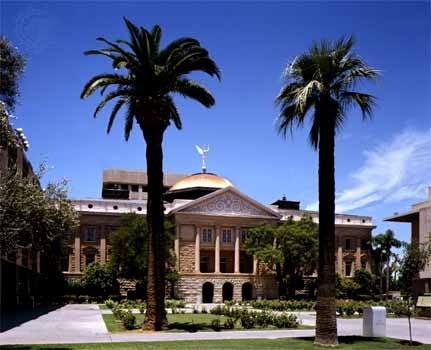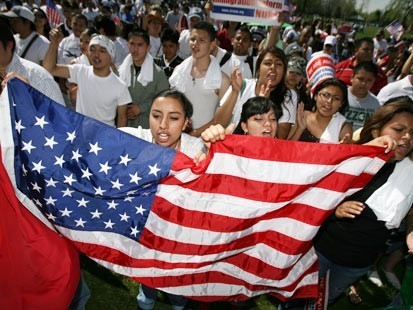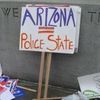Raul Ramos y Sanchez's Blog, page 22
April 11, 2011
Arkansas Literary Festival
Along with meeting new readers, the Arkansas Book Festival introduced me to the work of several authors I thought you'd like to know as well.
I've already started EXILES IN EDEN by Paul Reyes and am captivated by his poetic prose and unflinching insights into the human fallout of the toxic real estate assets accumulated by the nation's largest investment firms. Paul is contributing editor with Virgina Quarterly Review. His work has appeared in the Oxford American, Harper's, the New York Times, Slate, The Los Angeles Times Book Review, Details, Men's Vogue, and Mississippi Review. In 2010 he received a Literature Fellowship from the National Endowment for the Arts.

Another author I met with a fascinating book premise is Robert Reising. He is co-author of CHASING MOONLIGHT, the real life story of the Doc "Moonlight" Graham character played by Burt Lancaster in FIELD OF DREAMS. Bob was catcher on Michigan State University's 1954 Big Ten Conference championship team. He went on to become the head baseball coach at Duke and Furman universities and the University of South Carolina. As a professor of history at the University of North Carolina at Pembroke, he became the world's foremost scholar on Jim Thorpe.

 Raul Ramos y Sanchez and Robert W. ReisingA third writer whose work I found intriguing is Matt de la Peña, a YA author with a unique perspective on the Latino experience for all young readers. His first novel, MEXICAN WHITE BOY, reveals the challenges of being a person who defies ethnic stereotypes.
Raul Ramos y Sanchez and Robert W. ReisingA third writer whose work I found intriguing is Matt de la Peña, a YA author with a unique perspective on the Latino experience for all young readers. His first novel, MEXICAN WHITE BOY, reveals the challenges of being a person who defies ethnic stereotypes.

My thanks again to the staff of the Arkansas Literary Festival for bringing readers and writers together and sharing the gift of the written word.
Raul Ramos y Sanchez
[image error]

I've already started EXILES IN EDEN by Paul Reyes and am captivated by his poetic prose and unflinching insights into the human fallout of the toxic real estate assets accumulated by the nation's largest investment firms. Paul is contributing editor with Virgina Quarterly Review. His work has appeared in the Oxford American, Harper's, the New York Times, Slate, The Los Angeles Times Book Review, Details, Men's Vogue, and Mississippi Review. In 2010 he received a Literature Fellowship from the National Endowment for the Arts.

Another author I met with a fascinating book premise is Robert Reising. He is co-author of CHASING MOONLIGHT, the real life story of the Doc "Moonlight" Graham character played by Burt Lancaster in FIELD OF DREAMS. Bob was catcher on Michigan State University's 1954 Big Ten Conference championship team. He went on to become the head baseball coach at Duke and Furman universities and the University of South Carolina. As a professor of history at the University of North Carolina at Pembroke, he became the world's foremost scholar on Jim Thorpe.

 Raul Ramos y Sanchez and Robert W. ReisingA third writer whose work I found intriguing is Matt de la Peña, a YA author with a unique perspective on the Latino experience for all young readers. His first novel, MEXICAN WHITE BOY, reveals the challenges of being a person who defies ethnic stereotypes.
Raul Ramos y Sanchez and Robert W. ReisingA third writer whose work I found intriguing is Matt de la Peña, a YA author with a unique perspective on the Latino experience for all young readers. His first novel, MEXICAN WHITE BOY, reveals the challenges of being a person who defies ethnic stereotypes.
My thanks again to the staff of the Arkansas Literary Festival for bringing readers and writers together and sharing the gift of the written word.
Raul Ramos y Sanchez

[image error]
Published on April 11, 2011 07:12
April 9, 2011
Arkansas Literary Festival
I awoke to a pleasant surprise. My session today at the Arkansas Literary Festival was featured on the event's home page. My thanks to the staff for this special recognition. I will be speaking today at 2:30pm about HOUSE DIVIDED and will provide another update following the presentation.


[image error]



[image error]
Published on April 09, 2011 04:23
April 8, 2011
Arkansas Literary Festival
On my first day at the Arkansas Literary Festival I had the privilege to address 9-12th grade students at Oak Grove High School in North Little Rock. I was impressed by their interest in writing and the sophistication of their questions. It is always heartening to meet with young people and come away with a feeling that our future is good hands. My thanks to the faculty and staff at Oak Grove and especially to my host, Library Media Specialist Lisa Polk.
 Shortly, I'll heading to the author reception at the Arkansas Studies Institute. Tomorrow I will be presenting at the Main Library along with over seventy other others. Stay tuned for more news later.
Shortly, I'll heading to the author reception at the Arkansas Studies Institute. Tomorrow I will be presenting at the Main Library along with over seventy other others. Stay tuned for more news later.
Raul Ramos y Sanchez

[image error]

 Shortly, I'll heading to the author reception at the Arkansas Studies Institute. Tomorrow I will be presenting at the Main Library along with over seventy other others. Stay tuned for more news later.
Shortly, I'll heading to the author reception at the Arkansas Studies Institute. Tomorrow I will be presenting at the Main Library along with over seventy other others. Stay tuned for more news later.Raul Ramos y Sanchez

[image error]
Published on April 08, 2011 17:01
April 7, 2011
Arkansas Literary Festival
As I prepare to leave for the Arkansas Literary Festival, I'd like to recognize the gracious hospitality of the festival's organizers -- and their expert organization. Beginning with my original invitation, I've received helpful messages about virtually every aspect of my visit. Flights, ground transportation, hotel reservation, agenda, all of these have been arranged with friendly messages. It's clear that the organizers of the Arkansas Literary Festival appreciate authors and are eager to make the event a success.
This will be my first visit to Arkansas and I'm looking forward to meeting the festival staff and making new friends.
For more details, you can visit the Arkansas Literary Festival website.
Raul Ramos y Sanchez


[image error]

This will be my first visit to Arkansas and I'm looking forward to meeting the festival staff and making new friends.
For more details, you can visit the Arkansas Literary Festival website.
Raul Ramos y Sanchez


[image error]
Published on April 07, 2011 03:42
March 22, 2011
Strategy Session Interview on KPFK in Los Angeles
At the request of those who missed the radio show live, here is a recording of my interview on KPFK's Strategy Session in Los Angeles with host Antonio Gonzalez from March 21, 2011.

[image error]


[image error]
Published on March 22, 2011 19:48
Arizona Republicans say "no mas" to punitive immigration laws

Faced with a sick economy made worse by a national boycott, Arizona Republicans finally saw the light. After a leading the nation into what many called 21st century Jim Crow laws, legislators in Phoenix pulled the plug on the latest wave of bigotry-posing-as-law. In a vote that included ten Senate Republicans, five new immigration control laws sponsored by Senator Russell Pearce went down in defeat.
Republican Senator John McComish said it best: "These immigration bills are a distraction.They could be a detriment to the growth of our economy, and they are something people don't want us to be focused on. It's time for us to take a timeout on immigration."
Politicians in other states planning similar bills are now watching warily. The price of bigotry just went up.
Well see how many other demagogues are willing to gamble their political futures on bashing the nation's fastest growing voting group.
Read more at New America Media.

[image error]
Published on March 22, 2011 15:18
March 21, 2011
Back on KPFK's Strategy Session
 After a brief visit on March 7, I will be back on the air today with the host of KPFK's Strategy Session, Antonio Gonzalez. He is president of the Southwest Voter Registration Education Project, the largest and oldest non-partisan Latino voter participation organization in the U.S.founded in 1974. We'll be discussing my novels and their connection to immigration and the Latino identity. You can listen on the air in Los Angeles or online from anywhere at the link below. Hope you can join us!
After a brief visit on March 7, I will be back on the air today with the host of KPFK's Strategy Session, Antonio Gonzalez. He is president of the Southwest Voter Registration Education Project, the largest and oldest non-partisan Latino voter participation organization in the U.S.founded in 1974. We'll be discussing my novels and their connection to immigration and the Latino identity. You can listen on the air in Los Angeles or online from anywhere at the link below. Hope you can join us!Monday, March 21, 20114:30pm Pacific Time - 7:30pm Eastern Time
Listen LiveOnline at http://www.kpfk.org/listen-live.htmlOn the air in Los Angeles on KPFK 90.7 FM


[image error]
Published on March 21, 2011 06:29
March 18, 2011
Inter-American Commission on Human Rights Criticizes U.S. treatment of immigration detainees
From the New York Times Immigrant Detentions Draw International FireBy KIRK SEMPLE
 A cell that held a family in Texas in 2007.Immigration enforcement in the United States is plagued by unjust treatment of detainees, including inadequate access to lawyers and insufficient medical care, and by the excessive use of prison-style detention, the human rights arm of the Organization of American States said Thursday.The group, the Inter-American Commission on Human Rights, issued those findings in a report that also took aim at a federal program that allows county and state law enforcement officials to enforce federal immigration laws. The report said the government had failed to ensure that local police were not singling out people by race or detaining illegal immigrants on the pretext of investigating crimes.The commission recommended that the federal government cancel the program, known as 287(g).While many of the findings reiterated criticisms that have been made before by immigrant advocates and others, the report appeared to be the first comprehensive review of American immigration enforcement in recent years by an international body of the organization's stature.The commission, based in Washington, has no enforcement powers, but it has considerable moral authority and a record of cooperation by member countries, including the United States.The 155-page report was based on hearings and research that began in 2008, including visits in July 2009 by a team of investigators to six American detention centers in Arizona and Texas.Since much of the research was completed, however, the Obama administration has begun a major overhaul of the detention system. A month after the commission's visits, immigration officials announced a sweeping plan to establish more centralized authority over the system and to renovate centers designed for penal detention to make them more appropriate for detainees facing deportation, particularly those accused of administrative violations.The administration said it would also close centers that were rarely used or failed to meet its standards, and would consolidate the nation's patchwork of detention centers to meet increasing demand in specific areas, especially near big cities. It also said it would explore alternatives to detention.Felipe González, president of the commission, acknowledged those plans but said the commission would withhold judgment on the efficacy of the reforms. "According to the information that we have so far, it's not clear that it's been implemented or will satisfy the international standards" of human rights, he said in an interview. The commission will continue monitoring immigration enforcement to ensure that its grievances were addressed, Mr. González added.A spokesman for the Department of Homeland Security, which oversees enforcement, said Thursday that the department would review the report, and made no further comment.Earlier, however, the Obama administration was given a draft. In their response, according to the report, administration officials pointed out that they had conducted their own comprehensive review of immigration enforcement and made "important changes."Still, the commission said it was "deeply troubled by the continual and widespread use of detention in immigration cases," the report said."The Inter-American Commission is convinced that in many if not the majority of cases, detention is a disproportionate measure and the alternatives to detention programs would be a more balanced means of serving the State's legitimate interest in ensuring compliance with immigration laws," the report said.Mr. González also expressed skepticism that the administration would provide less penal settings for immigrants held on administrative, rather than criminal, charges. "It's not clear to us whether the new system will really mean that the facility will provide migrants in detention with a system that is fully respectful of human rights," he said.Mr. González said his commission was inspired to investigate the system after receiving numerous requests from human rights advocates and civil society organizations. The group, he added, is now planning to investigate other immigration detention systems in the hemisphere.
A cell that held a family in Texas in 2007.Immigration enforcement in the United States is plagued by unjust treatment of detainees, including inadequate access to lawyers and insufficient medical care, and by the excessive use of prison-style detention, the human rights arm of the Organization of American States said Thursday.The group, the Inter-American Commission on Human Rights, issued those findings in a report that also took aim at a federal program that allows county and state law enforcement officials to enforce federal immigration laws. The report said the government had failed to ensure that local police were not singling out people by race or detaining illegal immigrants on the pretext of investigating crimes.The commission recommended that the federal government cancel the program, known as 287(g).While many of the findings reiterated criticisms that have been made before by immigrant advocates and others, the report appeared to be the first comprehensive review of American immigration enforcement in recent years by an international body of the organization's stature.The commission, based in Washington, has no enforcement powers, but it has considerable moral authority and a record of cooperation by member countries, including the United States.The 155-page report was based on hearings and research that began in 2008, including visits in July 2009 by a team of investigators to six American detention centers in Arizona and Texas.Since much of the research was completed, however, the Obama administration has begun a major overhaul of the detention system. A month after the commission's visits, immigration officials announced a sweeping plan to establish more centralized authority over the system and to renovate centers designed for penal detention to make them more appropriate for detainees facing deportation, particularly those accused of administrative violations.The administration said it would also close centers that were rarely used or failed to meet its standards, and would consolidate the nation's patchwork of detention centers to meet increasing demand in specific areas, especially near big cities. It also said it would explore alternatives to detention.Felipe González, president of the commission, acknowledged those plans but said the commission would withhold judgment on the efficacy of the reforms. "According to the information that we have so far, it's not clear that it's been implemented or will satisfy the international standards" of human rights, he said in an interview. The commission will continue monitoring immigration enforcement to ensure that its grievances were addressed, Mr. González added.A spokesman for the Department of Homeland Security, which oversees enforcement, said Thursday that the department would review the report, and made no further comment.Earlier, however, the Obama administration was given a draft. In their response, according to the report, administration officials pointed out that they had conducted their own comprehensive review of immigration enforcement and made "important changes."Still, the commission said it was "deeply troubled by the continual and widespread use of detention in immigration cases," the report said."The Inter-American Commission is convinced that in many if not the majority of cases, detention is a disproportionate measure and the alternatives to detention programs would be a more balanced means of serving the State's legitimate interest in ensuring compliance with immigration laws," the report said.Mr. González also expressed skepticism that the administration would provide less penal settings for immigrants held on administrative, rather than criminal, charges. "It's not clear to us whether the new system will really mean that the facility will provide migrants in detention with a system that is fully respectful of human rights," he said.Mr. González said his commission was inspired to investigate the system after receiving numerous requests from human rights advocates and civil society organizations. The group, he added, is now planning to investigate other immigration detention systems in the hemisphere.

[image error]

 A cell that held a family in Texas in 2007.Immigration enforcement in the United States is plagued by unjust treatment of detainees, including inadequate access to lawyers and insufficient medical care, and by the excessive use of prison-style detention, the human rights arm of the Organization of American States said Thursday.The group, the Inter-American Commission on Human Rights, issued those findings in a report that also took aim at a federal program that allows county and state law enforcement officials to enforce federal immigration laws. The report said the government had failed to ensure that local police were not singling out people by race or detaining illegal immigrants on the pretext of investigating crimes.The commission recommended that the federal government cancel the program, known as 287(g).While many of the findings reiterated criticisms that have been made before by immigrant advocates and others, the report appeared to be the first comprehensive review of American immigration enforcement in recent years by an international body of the organization's stature.The commission, based in Washington, has no enforcement powers, but it has considerable moral authority and a record of cooperation by member countries, including the United States.The 155-page report was based on hearings and research that began in 2008, including visits in July 2009 by a team of investigators to six American detention centers in Arizona and Texas.Since much of the research was completed, however, the Obama administration has begun a major overhaul of the detention system. A month after the commission's visits, immigration officials announced a sweeping plan to establish more centralized authority over the system and to renovate centers designed for penal detention to make them more appropriate for detainees facing deportation, particularly those accused of administrative violations.The administration said it would also close centers that were rarely used or failed to meet its standards, and would consolidate the nation's patchwork of detention centers to meet increasing demand in specific areas, especially near big cities. It also said it would explore alternatives to detention.Felipe González, president of the commission, acknowledged those plans but said the commission would withhold judgment on the efficacy of the reforms. "According to the information that we have so far, it's not clear that it's been implemented or will satisfy the international standards" of human rights, he said in an interview. The commission will continue monitoring immigration enforcement to ensure that its grievances were addressed, Mr. González added.A spokesman for the Department of Homeland Security, which oversees enforcement, said Thursday that the department would review the report, and made no further comment.Earlier, however, the Obama administration was given a draft. In their response, according to the report, administration officials pointed out that they had conducted their own comprehensive review of immigration enforcement and made "important changes."Still, the commission said it was "deeply troubled by the continual and widespread use of detention in immigration cases," the report said."The Inter-American Commission is convinced that in many if not the majority of cases, detention is a disproportionate measure and the alternatives to detention programs would be a more balanced means of serving the State's legitimate interest in ensuring compliance with immigration laws," the report said.Mr. González also expressed skepticism that the administration would provide less penal settings for immigrants held on administrative, rather than criminal, charges. "It's not clear to us whether the new system will really mean that the facility will provide migrants in detention with a system that is fully respectful of human rights," he said.Mr. González said his commission was inspired to investigate the system after receiving numerous requests from human rights advocates and civil society organizations. The group, he added, is now planning to investigate other immigration detention systems in the hemisphere.
A cell that held a family in Texas in 2007.Immigration enforcement in the United States is plagued by unjust treatment of detainees, including inadequate access to lawyers and insufficient medical care, and by the excessive use of prison-style detention, the human rights arm of the Organization of American States said Thursday.The group, the Inter-American Commission on Human Rights, issued those findings in a report that also took aim at a federal program that allows county and state law enforcement officials to enforce federal immigration laws. The report said the government had failed to ensure that local police were not singling out people by race or detaining illegal immigrants on the pretext of investigating crimes.The commission recommended that the federal government cancel the program, known as 287(g).While many of the findings reiterated criticisms that have been made before by immigrant advocates and others, the report appeared to be the first comprehensive review of American immigration enforcement in recent years by an international body of the organization's stature.The commission, based in Washington, has no enforcement powers, but it has considerable moral authority and a record of cooperation by member countries, including the United States.The 155-page report was based on hearings and research that began in 2008, including visits in July 2009 by a team of investigators to six American detention centers in Arizona and Texas.Since much of the research was completed, however, the Obama administration has begun a major overhaul of the detention system. A month after the commission's visits, immigration officials announced a sweeping plan to establish more centralized authority over the system and to renovate centers designed for penal detention to make them more appropriate for detainees facing deportation, particularly those accused of administrative violations.The administration said it would also close centers that were rarely used or failed to meet its standards, and would consolidate the nation's patchwork of detention centers to meet increasing demand in specific areas, especially near big cities. It also said it would explore alternatives to detention.Felipe González, president of the commission, acknowledged those plans but said the commission would withhold judgment on the efficacy of the reforms. "According to the information that we have so far, it's not clear that it's been implemented or will satisfy the international standards" of human rights, he said in an interview. The commission will continue monitoring immigration enforcement to ensure that its grievances were addressed, Mr. González added.A spokesman for the Department of Homeland Security, which oversees enforcement, said Thursday that the department would review the report, and made no further comment.Earlier, however, the Obama administration was given a draft. In their response, according to the report, administration officials pointed out that they had conducted their own comprehensive review of immigration enforcement and made "important changes."Still, the commission said it was "deeply troubled by the continual and widespread use of detention in immigration cases," the report said."The Inter-American Commission is convinced that in many if not the majority of cases, detention is a disproportionate measure and the alternatives to detention programs would be a more balanced means of serving the State's legitimate interest in ensuring compliance with immigration laws," the report said.Mr. González also expressed skepticism that the administration would provide less penal settings for immigrants held on administrative, rather than criminal, charges. "It's not clear to us whether the new system will really mean that the facility will provide migrants in detention with a system that is fully respectful of human rights," he said.Mr. González said his commission was inspired to investigate the system after receiving numerous requests from human rights advocates and civil society organizations. The group, he added, is now planning to investigate other immigration detention systems in the hemisphere.

[image error]
Published on March 18, 2011 01:42
March 17, 2011
Egypt and Latinos in America…Is an Uprising Coming Here?
This feature article from online news publication Hispanically Speaking News found parallels between the turmoil in Egypt and my novels AMERICA LIBRE and HOUSE DIVIDED.
Egypt and Latinos in America…Is an Uprising Coming Here?
March 17, 2011 | by HS News Staff
Unrest leads to protest, and protest can lead to change. This has not been any more apparent than the events that took place in Egypt. Middle-East experts are now watching the countries of Yemen and Libya to see how they take shape, but can the revolution spread to the United States?Raul Ramos y Sanchez has written American Libre and its sequel House Divided, which illustrates a situation in which Hispanics in the United States could have such an uprising.Sanchez says people seem to bypass events that happen around the world, unless something extreme is done. Twenty - four hour news cycles combined with the internet providing instant information has not only desensitized Americans, but has caused them to all but ignore injustice."Mubarak has been a dictator for 30 years. Once you have riots and see bleeding on the streets, then people start saying whet's going on. That's what's going on in American Libre and House Divided," said Sanchez. "[State governments] are now trying to pass a law changing the 14th amendment"At least two U.S. senators have experimented with the idea of denying automatic citizenship to U.S. - born children of illegal immigrants.GOP Senators, David Vitter of Louisiana and Rand Paul of Kentucky have introduced a measure to change the 14th Amendment to the U.S. Constitution so that children born in the United States cannot become citizens unless one parent is already a citizen, legal immigrant or active member of the armed forces.State legislators in Arizona and other states are preparing to challenge the rights to U.S. citizenship, hoping their state-by-state effort will eventually end up in the U.S. Supreme Court.
Currently, a child born on U.S. soil is a U.S. citizen regardless of whether or not their parents are U.S. citizens.Rep. Knox (R-Montana) has proposed a bill that states a child must have at least one parent who "owes no allegiance to any foreign sovereignty."Knox said, "The 14th amendment was never intended to guarantee citizenship to those born here of parents who are not themselves citizens. It was never intended to create a symbolic anchor that allows parents and other family members who are not citizens themselves to pass into the country and access to our many well-intended social services."Opponents of the bill say the state has no right to interpret the U.S. Constitution, they also state Knox's bill denies Montana citizenship to people who have dual citizenship.Lawmakers in 40 states, aside from Arizona, are pursuing this bill "to correct the monumental misapplication of the 14th Amendment of the U.S. Constitution," according to State Legislators for Legal Immigration.
-Ron Gould, a spokesman for SLLI says - "These folks are essentially gaming the system to put themselves ahead of the line,"The proposed bill to end birthright citizenship suggests that the government creates a specialty birth certificate for babies whose parents can't prove their citizenship.Sanchez - who lives id Dayton - also argues the contrary that states such as Arizona say undocumented people cost the state billions of dollars."They say every day; each American household is paying 100 dollars to support an undocumented person. Then they say we will take all remittances by people sending money out of the country, but those who are undocumented will be afraid to apply"The Cuban born Sanchez noted while lawmakers are continuing to sponsor anti-Latino legislation, it causes mistrust amongst Latino communities and their representatives, much like what has happened already in Cairo. Egypt.
"Its building: the day may come when there will be a Mubarak moment," Sanchez said… "They will be in Los Angelos; they will be in Miami etc."
Though Sanchez's novels foresee a future of division, he is optimistic."I hope that my novel, American Libre and House Divided) will illustrate that before it happens," said Sanchez. "[Politicians} know that the areas of the country that are growing are also areas with high Latino populations."Reports have suggested the Internet was an important tool used by protesters in Egypt. Social networks such as Twitter and Facebook were used to organize times, dates, and rallying cries of protest. Cell phones were used to send text messages, video, and pictures around the world to illustrate what was actually happening in Egypt, despite the messages sent out through state television stations.However, for an intermediate amount of time during the protest in Cairo, the internet and cell phones were shut down in the attempt to prevent information from leaving the country.Along with technological censorship, foreign reporters from around the world were not granted access to several locations and had to report from their hotel rooms. State reporters were given ultimatums, either report what the Egyptian government says, or lose their jobs, according to news reports."It used to be the first thing they did was shut down the radio and newspapers," said Sanchez who is an advertising executive by trade.Two-thirds of Hispanics went online in 2010; primary through cell phones according to a Pew Hispanic Research study, released in Feb. 2011The interior ministry of Egypt was reported saying dissidents "sent messages to citizens to gather in a number of mosques in the provinces during Friday prayers."The protesters by in large were not poor, they were not malnourished, the protestors were middle class and educated, they afforded cell phones and quality homes. Their anger was not fueled by poverty, it was fueled by tyranny, it was fueled by the lack of representation of the people.
[image error]

Egypt and Latinos in America…Is an Uprising Coming Here?

March 17, 2011 | by HS News Staff
Unrest leads to protest, and protest can lead to change. This has not been any more apparent than the events that took place in Egypt. Middle-East experts are now watching the countries of Yemen and Libya to see how they take shape, but can the revolution spread to the United States?Raul Ramos y Sanchez has written American Libre and its sequel House Divided, which illustrates a situation in which Hispanics in the United States could have such an uprising.Sanchez says people seem to bypass events that happen around the world, unless something extreme is done. Twenty - four hour news cycles combined with the internet providing instant information has not only desensitized Americans, but has caused them to all but ignore injustice."Mubarak has been a dictator for 30 years. Once you have riots and see bleeding on the streets, then people start saying whet's going on. That's what's going on in American Libre and House Divided," said Sanchez. "[State governments] are now trying to pass a law changing the 14th amendment"At least two U.S. senators have experimented with the idea of denying automatic citizenship to U.S. - born children of illegal immigrants.GOP Senators, David Vitter of Louisiana and Rand Paul of Kentucky have introduced a measure to change the 14th Amendment to the U.S. Constitution so that children born in the United States cannot become citizens unless one parent is already a citizen, legal immigrant or active member of the armed forces.State legislators in Arizona and other states are preparing to challenge the rights to U.S. citizenship, hoping their state-by-state effort will eventually end up in the U.S. Supreme Court.
Currently, a child born on U.S. soil is a U.S. citizen regardless of whether or not their parents are U.S. citizens.Rep. Knox (R-Montana) has proposed a bill that states a child must have at least one parent who "owes no allegiance to any foreign sovereignty."Knox said, "The 14th amendment was never intended to guarantee citizenship to those born here of parents who are not themselves citizens. It was never intended to create a symbolic anchor that allows parents and other family members who are not citizens themselves to pass into the country and access to our many well-intended social services."Opponents of the bill say the state has no right to interpret the U.S. Constitution, they also state Knox's bill denies Montana citizenship to people who have dual citizenship.Lawmakers in 40 states, aside from Arizona, are pursuing this bill "to correct the monumental misapplication of the 14th Amendment of the U.S. Constitution," according to State Legislators for Legal Immigration.
-Ron Gould, a spokesman for SLLI says - "These folks are essentially gaming the system to put themselves ahead of the line,"The proposed bill to end birthright citizenship suggests that the government creates a specialty birth certificate for babies whose parents can't prove their citizenship.Sanchez - who lives id Dayton - also argues the contrary that states such as Arizona say undocumented people cost the state billions of dollars."They say every day; each American household is paying 100 dollars to support an undocumented person. Then they say we will take all remittances by people sending money out of the country, but those who are undocumented will be afraid to apply"The Cuban born Sanchez noted while lawmakers are continuing to sponsor anti-Latino legislation, it causes mistrust amongst Latino communities and their representatives, much like what has happened already in Cairo. Egypt.
"Its building: the day may come when there will be a Mubarak moment," Sanchez said… "They will be in Los Angelos; they will be in Miami etc."
Though Sanchez's novels foresee a future of division, he is optimistic."I hope that my novel, American Libre and House Divided) will illustrate that before it happens," said Sanchez. "[Politicians} know that the areas of the country that are growing are also areas with high Latino populations."Reports have suggested the Internet was an important tool used by protesters in Egypt. Social networks such as Twitter and Facebook were used to organize times, dates, and rallying cries of protest. Cell phones were used to send text messages, video, and pictures around the world to illustrate what was actually happening in Egypt, despite the messages sent out through state television stations.However, for an intermediate amount of time during the protest in Cairo, the internet and cell phones were shut down in the attempt to prevent information from leaving the country.Along with technological censorship, foreign reporters from around the world were not granted access to several locations and had to report from their hotel rooms. State reporters were given ultimatums, either report what the Egyptian government says, or lose their jobs, according to news reports."It used to be the first thing they did was shut down the radio and newspapers," said Sanchez who is an advertising executive by trade.Two-thirds of Hispanics went online in 2010; primary through cell phones according to a Pew Hispanic Research study, released in Feb. 2011The interior ministry of Egypt was reported saying dissidents "sent messages to citizens to gather in a number of mosques in the provinces during Friday prayers."The protesters by in large were not poor, they were not malnourished, the protestors were middle class and educated, they afforded cell phones and quality homes. Their anger was not fueled by poverty, it was fueled by tyranny, it was fueled by the lack of representation of the people.

[image error]
Published on March 17, 2011 08:23
March 10, 2011
Arizona's latest round of legislative xenophobia
This article by University of Arizona professor Roberto Dr. Cintli Rodriguez outlines the latest onslaught of xenophobic laws proposed by the Arizona legislature.
Arizona Refuses to Take Backseat to History
The state's rogue legislators have stepped forward to once again capture the 19th century spotlightBy Roberto Dr. Cintli Rodriguez | Published on LatinoLA: March 9, 2011 Sometimes columns just seem to write themselves. The world is aflame, particularly in North Africa and the Middle East, and as a result, extremist Arizona legislators seems to be getting a complex… nobody seems to be paying as much attention to them compared to just several weeks ago. Even Wisconsin has managed to upstage the rogue Arizona legislators. Utah too. As such, the Arizona rogue legislators have stepped forward to once again capture the 19th century spotlight.
Sometimes columns just seem to write themselves. The world is aflame, particularly in North Africa and the Middle East, and as a result, extremist Arizona legislators seems to be getting a complex… nobody seems to be paying as much attention to them compared to just several weeks ago. Even Wisconsin has managed to upstage the rogue Arizona legislators. Utah too. As such, the Arizona rogue legislators have stepped forward to once again capture the 19th century spotlight.
Arizona put itself on the map in 2010 for passing several bills that appear to send out the message that brown people are not welcome. The bill, SB 1070, the one that compels local police to seek out the legal status of suspects based on the nebulous concept of "reasonable suspicion," is as close to official ethnic cleansing as one can get. Because the "migra" or immigration services have long had that power, on the streets "reasonable suspicion" translates to brown skin and the use of the Spanish language.
The HB 2281 bill is an attempt to deny the teaching of Ethnic Studies in Arizona. Its first target is Tucson's highly successful Mexican American Studies K-12 program. The attack on this program amounts to cultural genocide, though many people bristle at that description. Yet, how else to describe an attempt to forcefully assimilate any population?
But all that is so 2010.
2011 in Arizona began with not simply declaring Mexican American Studies illegal – with an April 18 deadline to dismantle the program – but with a flurry of bills that make both of these bills seem Mexican-friendly.
The following will give you an example of the environment we are living – this, in the midst of a huge nationwide state-by-state budget crisis in which Mexicans always become convenient scapegoats.
Several of the bills, include:
SB 1611. This so-called omnibus immigration bill is the equivalent of a free-for all. It is a collection of all the most extreme anti-immigrant ideas under one bill. Among its many features, it prohibits students from enrolling in K-12 without proof of U.S.-birth certificates or naturalization documents. This bill goes contrary to the Plyler v. Doe 1982 Supreme Court decision. It does the same for community colleges. It also permits the state housing authority to evict all residents of a public housing unit if one of the occupants is undocumented. "Driving while undocumented" would hereafter be a crime and the driver would lose the vehicle they are driving. It also forces companies to use the voluntary E-Verify system or lose their business license.
SB 1308 and SB 1309. These bills call for the nullification of birthright citizenship, reinterpreting the 14th amendment as no longer operative in Arizona. These bills would result in the creation of two types of birth certificates; one for citizens and one for those whose citizenship of the parents cannot be proven.
Truthfully, these two bills seem to be the holy grail of the 2011 bills. The rest appear to be subterfuge. The state legislators know that even when passed, they would be automatically challenged in court. But that's the objective; if they were to succeed – via a Supreme Court decision – it would accomplish the objective of creating a larger deportable population. This is not an Arizona plan either, but the plan by many dozens of extremist legislators from throughout the United States to overturn the 14th Amendment, an amendment they claim only should have applied to the descendants of slaves.
SB 1097: This bill forces students to identify the legal status of their parents and also punishes school personnel if they don't facilitate this identification process.
SB 1490: Requires food service workers to provide proof of citizenship.
SB 1406: Authorizes the creation of a wall using private funding and inmate labor.
SB1405: Requires hospitals to check for legal documentation before accepting patients.
SCR 1006: This would proclaim, contrary to all available data, the border as lawless and crime-ridden. It would call for further militarization of the border.
SB 1117/HB 2537: This would authorize Senate President Russell Pearce and House Speaker Kirk Adams, the unlimited power to use state funds to defend SB 1070.
Aside from creating an extremist slush fund, perhaps anticipating lawsuits or other court action, legislators have also proposed two even more mind-boggling laws:
SB 1443: This legislation creates a joint 12-member legislative commission to examine which federal laws are applicable to Arizona. The commission would determine which federal laws are unconstitutional.
SCR 1010: This would exempt Arizona from international laws, most of which concern themselves with the protection of peoples' inherent, inalienable and universal human rights.
Again, this is just a small sampling of this year's bills thus far, in part compiled by Derechos Humanos, an Arizona-based human rights organization. Until the political equation is altered, we can expect a flurry of more bills that will continue to be challenged in court, while stimulating calls to once again boycott this state – seemingly the last bastion of Manifest Destiny.
Now for the bad news out of Utah… 3 more bills:
HB 497: Think Arizona and SB 1070. Same draconian racial profiling measures. For it to be implemented, it would have to survive a court challenge.
HB 116: Utah's very own Bracero Program. Would require a federal waiver. Without one, states currently cannot create their guest worker program.
HB 466: Permits Utah to enter into agreement with Mexican state of Nuevo Leon to facilitate federal migrant worker program.
These three are up for the governor's signature (or veto) next week.
The rest of the country seems to have slowed up, perhaps simply waiting for Arizona to take the lead (to exhaust its finances on defending these draconian bills in the courtroom).
The good news in all this is that Precious Knowledge, a film that documents the inspiring story of the threatened MAS-TUSD program will have its U.S. nationwide premier on March 24.
Rodriguez is a professor at the University of ArizonaFind this story online at www.latinola.com/story.php?story=9347
[image error]

Arizona Refuses to Take Backseat to History
The state's rogue legislators have stepped forward to once again capture the 19th century spotlightBy Roberto Dr. Cintli Rodriguez | Published on LatinoLA: March 9, 2011
 Sometimes columns just seem to write themselves. The world is aflame, particularly in North Africa and the Middle East, and as a result, extremist Arizona legislators seems to be getting a complex… nobody seems to be paying as much attention to them compared to just several weeks ago. Even Wisconsin has managed to upstage the rogue Arizona legislators. Utah too. As such, the Arizona rogue legislators have stepped forward to once again capture the 19th century spotlight.
Sometimes columns just seem to write themselves. The world is aflame, particularly in North Africa and the Middle East, and as a result, extremist Arizona legislators seems to be getting a complex… nobody seems to be paying as much attention to them compared to just several weeks ago. Even Wisconsin has managed to upstage the rogue Arizona legislators. Utah too. As such, the Arizona rogue legislators have stepped forward to once again capture the 19th century spotlight.Arizona put itself on the map in 2010 for passing several bills that appear to send out the message that brown people are not welcome. The bill, SB 1070, the one that compels local police to seek out the legal status of suspects based on the nebulous concept of "reasonable suspicion," is as close to official ethnic cleansing as one can get. Because the "migra" or immigration services have long had that power, on the streets "reasonable suspicion" translates to brown skin and the use of the Spanish language.
The HB 2281 bill is an attempt to deny the teaching of Ethnic Studies in Arizona. Its first target is Tucson's highly successful Mexican American Studies K-12 program. The attack on this program amounts to cultural genocide, though many people bristle at that description. Yet, how else to describe an attempt to forcefully assimilate any population?
But all that is so 2010.
2011 in Arizona began with not simply declaring Mexican American Studies illegal – with an April 18 deadline to dismantle the program – but with a flurry of bills that make both of these bills seem Mexican-friendly.
The following will give you an example of the environment we are living – this, in the midst of a huge nationwide state-by-state budget crisis in which Mexicans always become convenient scapegoats.
Several of the bills, include:
SB 1611. This so-called omnibus immigration bill is the equivalent of a free-for all. It is a collection of all the most extreme anti-immigrant ideas under one bill. Among its many features, it prohibits students from enrolling in K-12 without proof of U.S.-birth certificates or naturalization documents. This bill goes contrary to the Plyler v. Doe 1982 Supreme Court decision. It does the same for community colleges. It also permits the state housing authority to evict all residents of a public housing unit if one of the occupants is undocumented. "Driving while undocumented" would hereafter be a crime and the driver would lose the vehicle they are driving. It also forces companies to use the voluntary E-Verify system or lose their business license.
SB 1308 and SB 1309. These bills call for the nullification of birthright citizenship, reinterpreting the 14th amendment as no longer operative in Arizona. These bills would result in the creation of two types of birth certificates; one for citizens and one for those whose citizenship of the parents cannot be proven.
Truthfully, these two bills seem to be the holy grail of the 2011 bills. The rest appear to be subterfuge. The state legislators know that even when passed, they would be automatically challenged in court. But that's the objective; if they were to succeed – via a Supreme Court decision – it would accomplish the objective of creating a larger deportable population. This is not an Arizona plan either, but the plan by many dozens of extremist legislators from throughout the United States to overturn the 14th Amendment, an amendment they claim only should have applied to the descendants of slaves.
SB 1097: This bill forces students to identify the legal status of their parents and also punishes school personnel if they don't facilitate this identification process.
SB 1490: Requires food service workers to provide proof of citizenship.
SB 1406: Authorizes the creation of a wall using private funding and inmate labor.
SB1405: Requires hospitals to check for legal documentation before accepting patients.
SCR 1006: This would proclaim, contrary to all available data, the border as lawless and crime-ridden. It would call for further militarization of the border.
SB 1117/HB 2537: This would authorize Senate President Russell Pearce and House Speaker Kirk Adams, the unlimited power to use state funds to defend SB 1070.
Aside from creating an extremist slush fund, perhaps anticipating lawsuits or other court action, legislators have also proposed two even more mind-boggling laws:
SB 1443: This legislation creates a joint 12-member legislative commission to examine which federal laws are applicable to Arizona. The commission would determine which federal laws are unconstitutional.
SCR 1010: This would exempt Arizona from international laws, most of which concern themselves with the protection of peoples' inherent, inalienable and universal human rights.
Again, this is just a small sampling of this year's bills thus far, in part compiled by Derechos Humanos, an Arizona-based human rights organization. Until the political equation is altered, we can expect a flurry of more bills that will continue to be challenged in court, while stimulating calls to once again boycott this state – seemingly the last bastion of Manifest Destiny.
Now for the bad news out of Utah… 3 more bills:
HB 497: Think Arizona and SB 1070. Same draconian racial profiling measures. For it to be implemented, it would have to survive a court challenge.
HB 116: Utah's very own Bracero Program. Would require a federal waiver. Without one, states currently cannot create their guest worker program.
HB 466: Permits Utah to enter into agreement with Mexican state of Nuevo Leon to facilitate federal migrant worker program.
These three are up for the governor's signature (or veto) next week.
The rest of the country seems to have slowed up, perhaps simply waiting for Arizona to take the lead (to exhaust its finances on defending these draconian bills in the courtroom).
The good news in all this is that Precious Knowledge, a film that documents the inspiring story of the threatened MAS-TUSD program will have its U.S. nationwide premier on March 24.
Rodriguez is a professor at the University of ArizonaFind this story online at www.latinola.com/story.php?story=9347

[image error]
Published on March 10, 2011 11:51



